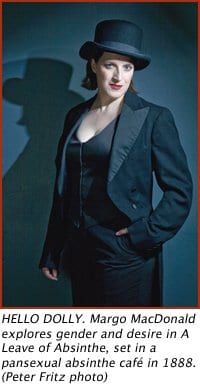Straight people get drunk and experiment with gay sex — it’s good fodder for advice columns. Was the open bar at the wedding really your reason for kissing that gorgeous bridesmaid?
I have always been amused reading sexual advice columns containing letters from straights alarmed by their first (accidental?) gay encounter. Their continued claim to heterosexuality usually involves an excuse about being drunk when the incident occurred.
Getting hammered can pardon those who cannot yet fully embrace their desires. Drugs and booze are a free pass to cheat on our spouses and pursue members of the same sex; they allow us to become whores, to seem intelligent, to appear charming, and most of all to be artists.
Local theatre company Mutatis Mutandis takes a look at the sheer power given to a certain mysterious drink, the infamous Green Fairy. As part of this year’s Ottawa and Montreal fringe festivals, the company presents A Leave of Absinthe — a collection of scenes that revolve around the absinthe culture of France, 1888.
During the late 19th century, absinthe was popular in bars and cafés among the wealthy bourgeois and Bohemian artists. In fact, it was reported that certain French prostitutes, having not eaten in three days, would provide sexual favours in exchange for shots of absinthe. If you believe the literature of the time, the drink was behind every debauchery and licentious activity that occurred in these cafés.
“Absinthe has been blamed rightly or wrongly — usually wrongly — for a great deal of radical and scandalous behaviour. Not least of this ‘blame’ was directed at scandalous behaviour by women, the drink supposedly prompting them to abandon their traditional roles and responsibilities, showing instead degrees of independence, free thought and eschewing a subservient role to men — and yes, even ‘turning’ lesbian,” explains director David Whiteley.
Whiteley is gaining a reputation for writing gender-bending adaptations of classic plays. In the fall, he adapted and directed Othella, swapping a female Moor into Shakespeare’s tragedy. For last year’s Fringe, Whiteley wrote and performed in What Goes Around…, a translation of Arthur Schnitzler’s play consisting of 10 love scenes. Same sex love stole the show, thanks to steamy lesbian eroticism from actress Margo MacDonald.
In this new production, MacDonald plays one of the scandalous women whose intake of the green drink causes her to reveal her desire for other women, expressed through the seduction of a young doll.
“Why should I care what men think? I have a lover, too; she’s a dancer. Absinthe will free you. One more sip and you could kiss me,” MacDonald recites lines from the script that the actors have been workshopping.
Teri Rata Loretto (director of Toto Too’s Theatrelife last August) plays Charlotte the Harlot, as well as a nurse describing the scientific process of testing absinthe on guinea pigs. As the collective has discovered, most of the results were a little contrived and highly exaggerated.
“This comes directly from the lab notes: ‘you see in its eyes, the impulse to kill,'” dramatizes Loretto, amused by these descriptions of murderous rodents under the influence.
Rounding out the cast are our cover models, actors David Hersh as café host Salis, and Richard Gélinas playing the satirical writer Allais.
Enthused by several doses of absinthe, they take on the role of two further historical figures —the poets Paul Verlaine and a 17-year-old Arthur Rimbaud. Their infamous affair was said to revolve around art and absinthe.
“No one today — or no one of credibility or consequence, at least — could take seriously the idea that this drink perverted French poets Rimbaud and Verlaine to become homosexual lovers, or that women changed their sexual orientation as a result of drinking Absinthe. But the fact that a drink could be responsible for such transformations was fascinating for us, and we’re confident it will likewise captivate our audiences,” says Whiteley.

 Why you can trust Xtra
Why you can trust Xtra


